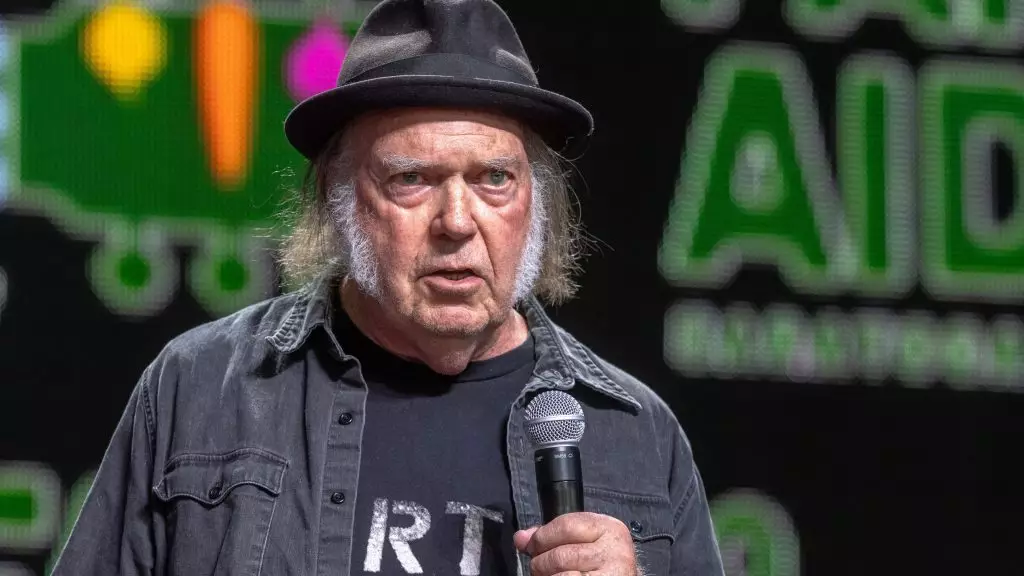The relationship between artists and major music festivals is often fraught with complexities, but few scenarios illustrate this as dramatically as Neil Young’s recent on-again, off-again status with the iconic Glastonbury Festival. Initially announcing his decision to withdraw from the legendary event due to concerns over corporate influence, Young stunned fans and the music community alike. However, in a surprising turn that underscored the unpredictable nature of the music industry, he swiftly reversed that decision, confirming his participation just hours later. This article explores the nuanced dynamics that led to this extraordinary series of events and what they reveal about contemporary music festivals and artist autonomy.
The genesis of Young’s discontent can be traced to allegations of the festival falling under what he termed “corporate control,” specifically referencing the BBC’s partnership with Glastonbury. His comments spotlighted a critical issue in the world of music festivals today: the tension between artistic freedom and commercial interests. Young’s initial statement articulated a deep-seated frustration with how corporate entities can often constrain the creative spirit of festivals that were once seen as bastions of artistic expression. His passionate plea against this transformation evoked a sense of nostalgia for a more uninhibited festival era, reflecting a broader cultural discourse on the commercialization of art.
In an era where festivals are increasingly seen as lucrative platforms for corporate branding and media visibility, Young’s critique resonated with many who feel that the heart and soul of these events are being gradually eroded. His declaration of abstaining from Glastonbury was not merely a personal stance but a rallying point for those who believe in preserving the authenticity of live music experiences.
Young’s decision to return to the Glastonbury lineup came as a welcome surprise to many. His clarification pointed to a miscommunication that led him to believe inaccurately about the nature of the event’s corporate partnerships. The retraction of his withdrawal highlights the unpredictability of modern artist-festival relationships, where the stakes are often immense and can fluctuate dramatically based on rapidly evolving contexts and discussions.
This sudden reversal underscores another significant point: the importance of dialogue in the music industry. While artists like Young grapple with autonomy and artistic integrity, organizers must also navigate the realities of media partnerships and sponsor relations. Young’s eventual confirmation to perform displays not only a willingness to engage with the festival but also opens a door for constructive conversations around the balance between commercial interests and artistic values.
Glastonbury event organizer Emily Eavis expressed excitement at the prospect of Young’s return, confirming his enduring status as a treasured figure within the festival’s history. The community response to Young’s initial withdrawal expressed a mix of disappointment and understanding — fans care deeply about the values that artists represent and their interactions with mainstream media platforms.
Moreover, Young’s initial decision and his quick pivot back to the festival lineup underscored the deep emotional connections that such events foster. The festival is not merely a stage; it’s a collective experience that brings together diverse musical legacies and fan cultures. Young is not unique in his approach to protecting his music and message. His past decisions, including withdrawing his catalog from Spotify, serve as a reminder of the moral complexities artists face today.
Neil Young’s journey towards participating in Glastonbury serves as a poignant case study, illustrating the ongoing struggle between artistic integrity and commercial interests within the music industry. Artists are feeling the weight of expectations and responsibilities that go beyond mere performance; they are, in many ways, cultural representatives navigating complex societal issues. As festivals like Glastonbury continue to grow and adapt within the entertainment landscape, the dialogue surrounding artist autonomy, corporate partnerships, and festival integrity remains vital. Ultimately, the hope is that such exchanges foster environments that honor creative expression while encouraging a mindful partnership between artists, organizers, and audiences alike.


Leave a Reply